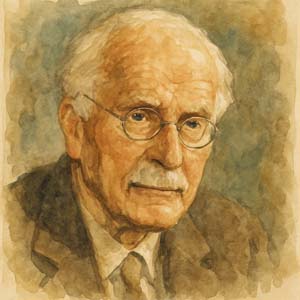— Carl Jung
 The founder of analytical psychology and the concept of the "collective unconscious," psychiatrist Carl Gustav Jung (1875–1961) was born on this day in Kesswil, Switzerland, the son of a parish minister.
The founder of analytical psychology and the concept of the "collective unconscious," psychiatrist Carl Gustav Jung (1875–1961) was born on this day in Kesswil, Switzerland, the son of a parish minister.
“I do not believe... I know,” he once declared, reflecting his deep conviction in the unseen.
Jung’s encounter with Sigmund Freud in 1907 sparked collaboration and debate. Though they both explored the unconscious mind, Jung’s 1911 book The Psychology of the Unconscious diverged from Freud’s focus on sexuality, paving a unique path toward spiritual depth and personal transformation.
“When I parted from Freud,” Jung wrote, “I knew that I was plunging into the unknown.” This step into darkness became a journey toward inner light. He later described this as a symbolic death of the false self—"egocide"—and a rebirth into wholeness, a process he called individuation.
Jung introduced the now-famous ideas of introversion and extraversion. “The creative mind plays with the objects it loves,” he said, revealing the playful necessity of the creative instinct in psychological healing.
For Jung, spirituality was essential to mental health. He studied mythology and archetypes around the world, listening to dreams and symbols like whispers from the soul.
“Show me a sane man,” he once quipped, “and I will cure him for you.”
More Carl JUNG Quotations
 Flow with the knowing of your soul. 🌀
Flow with the knowing of your soul. 🌀
